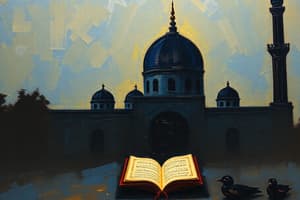Podcast
Questions and Answers
The word 'Islam' originates from an Arabic term that signifies:
The word 'Islam' originates from an Arabic term that signifies:
- Charity and almsgiving
- Devotion and prayer
- Submission to Allah (correct)
- Peace and harmony
Which of the following is the holy book in Islam?
Which of the following is the holy book in Islam?
- Qur'an (correct)
- Vedas
- Bible
- Torah
Followers of Islam are commonly referred to as:
Followers of Islam are commonly referred to as:
- Christians
- Buddhists
- Muslims (correct)
- Jews
The central figure and prophet in Islam is:
The central figure and prophet in Islam is:
The place of worship for Muslims is known as a:
The place of worship for Muslims is known as a:
Which of the following correctly lists the Five Pillars of Islam?
Which of the following correctly lists the Five Pillars of Islam?
What does 'Shahadah' represent in the context of the Five Pillars of Islam?
What does 'Shahadah' represent in the context of the Five Pillars of Islam?
'Salah' refers to which of the following practices in Islam?
'Salah' refers to which of the following practices in Islam?
Zakat, one of the Five Pillars of Islam, is best described as:
Zakat, one of the Five Pillars of Islam, is best described as:
The annual pilgrimage to Mecca is known as:
The annual pilgrimage to Mecca is known as:
During the month of Ramadan, Muslims observe:
During the month of Ramadan, Muslims observe:
Islamic education primarily focuses on:
Islamic education primarily focuses on:
Which of the following is considered an aim of Islamic education?
Which of the following is considered an aim of Islamic education?
In the context of Islamic philosophy of education, what does 'Ontology' primarily deal with?
In the context of Islamic philosophy of education, what does 'Ontology' primarily deal with?
'Epistemology' in Islamic philosophy refers to the:
'Epistemology' in Islamic philosophy refers to the:
Axiology, as a branch of Islamic philosophy, is concerned with:
Axiology, as a branch of Islamic philosophy, is concerned with:
Which of the following represents primary education in Islamic education?
Which of the following represents primary education in Islamic education?
Madarsas primarily focus on:
Madarsas primarily focus on:
Which language is NOT typically a part of the curriculum at the Maktaba level?
Which language is NOT typically a part of the curriculum at the Maktaba level?
What is the primary focus of religious education in Madarsas?
What is the primary focus of religious education in Madarsas?
Which teaching method is commonly employed in Maktaba?
Which teaching method is commonly employed in Maktaba?
What teaching method is typically emphasized in Madarsas?
What teaching method is typically emphasized in Madarsas?
In Islamic education, a teacher is often referred to as a(n):
In Islamic education, a teacher is often referred to as a(n):
What is primarily emphasized for students (Shagird) in Islamic education?
What is primarily emphasized for students (Shagird) in Islamic education?
How are students typically evaluated in Islamic education?
How are students typically evaluated in Islamic education?
What is a key educational implication of Islamic education?
What is a key educational implication of Islamic education?
Which of the following languages received encouragement under Islamic education?
Which of the following languages received encouragement under Islamic education?
A significant merit of Islamic education was the:
A significant merit of Islamic education was the:
A criticism of Islamic education includes:
A criticism of Islamic education includes:
What was a drawback of Islamic education regarding languages?
What was a drawback of Islamic education regarding languages?
Flashcards
What is Islam?
What is Islam?
Refers to 'submission (to Allah)' in Arabic. It is the second largest religion in the world.
What is the Qur'an?
What is the Qur'an?
The holy book of Islam, viewed as the direct word of God.
What is a Masjid?
What is a Masjid?
A Muslim's place of worship.
What are the Five Pillars of Islam?
What are the Five Pillars of Islam?
Signup and view all the flashcards
What is Shahadah?
What is Shahadah?
Signup and view all the flashcards
What is Salah?
What is Salah?
Signup and view all the flashcards
What is Zakat?
What is Zakat?
Signup and view all the flashcards
What is Hajj?
What is Hajj?
Signup and view all the flashcards
What is Sawm or Siyam?
What is Sawm or Siyam?
Signup and view all the flashcards
What is Islamic Education?
What is Islamic Education?
Signup and view all the flashcards
What is Ontology in Islamic context?
What is Ontology in Islamic context?
Signup and view all the flashcards
What is Epistemology in Islamic education?
What is Epistemology in Islamic education?
Signup and view all the flashcards
What is Axiology?
What is Axiology?
Signup and view all the flashcards
Educational organizations in Islamic education?
Educational organizations in Islamic education?
Signup and view all the flashcards
Teaching Methods in Maktaba?
Teaching Methods in Maktaba?
Signup and view all the flashcards
Teaching Methods in Madarsas?
Teaching Methods in Madarsas?
Signup and view all the flashcards
Roles of Teacher and Student in Islamic tradition?
Roles of Teacher and Student in Islamic tradition?
Signup and view all the flashcards
What are Educational implications?
What are Educational implications?
Signup and view all the flashcards
What are Demerits of Islamic education?
What are Demerits of Islamic education?
Signup and view all the flashcards
Study Notes
- Islam is derived from the Arabic word "islām" which means "submission (to Allah)."
- The holy book of Islam is the Qur'an (Quran or Koran).
- Followers of Islam are called Muslims.
- The Prophet of Islam is Muhammad.
- The place of worship in Islam is the Masjid (mosque).
- Islam is the second-largest religion in the world.
The Five Pillars of Islam
- The Five Pillars are Shahadah, Salah, Zakat, Hajj, and Fasting.
- Shahadah is faith.
- Salah is prayer.
- Zakat is charity.
- Hajj is pilgrimage.
- Sawm or siyam is fasting. Fasting involves praying five daily prayers, studying Islamic knowledge, reciting the Holy Quran, doing lots of Dhikr, making lots of Duaa, giving in charity, and helping the poor.
Islamic Education
- Islamic education is religious in character.
- It contributes to the spread of Islam.
- It helps in the preservation of Muslim culture.
Aims of Islamic Education
- To perfect all dimensions of human beings.
- To enable individuals to be good Muslims.
- To encourage people to live as prophet Muhammad did
- To foster personality and character development.
- To aid in understanding the Quran.
- Education aims to promote awareness of responsibility as Muslims.
- The Islamic education aims to develop spiritual knowledge.
- Islamic education aims to develop critical thinking and problem-solving skills.
- It prepares students for a life of purity and sincerity.
- It teaches about the Five Pillars of Islam.
Areas of Islamic Philosophy of Education
- Metaphysics (Believes/ Ontology) concept includes God and his attributes.
- Epistemology covers the concept of knowledge.
- Axiology relates to the concept of values.
Ontology
- Ontology explores the nature of reality.
- It deals with the world and the universe.
- It investigates Allah's relation to man.
- It discusses the soul.
- It considers man's power.
- It addresses death.
- It deals with the concept of life after death.
Epistemology
- Deductive knowledge: Knowledge by inference (Ilm al-Yaqin).
- Observatory knowledge: Knowledge by perception (Ain al-Yaqin).
- Empirical knowledge: Knowledge by personal experience or intuition (Haq al-Yaqin).
Axiology
- Life.
- Religion.
- Eternity.
- Unity.
- Truth/wisdom.
- Knowledge.
- Love.
- Justice.
- Goodness.
- Beauty.
Organization of Islamic Education
- Bismillah marks the start of education.
- Maktaba serves as primary education.
- Madarsas provide higher education.
Curriculum
- Maktaba focuses on the letters of alphabets, e.g., Urdu, Arabic, Persian.
- Stories of Muslim Fakirs are taught.
- Poems of Persian Poets are included as part of the curriculum.
- Grammar and literature, history of laws of Islam, astrology, history, geography, agriculture, Unani system of medicine are taught.
- Madarsas Religious education involves intensive and critical analysis of the Quran.
- Intensive study of Islamic Law.
- Sufism.
- The heritage of Mohammad Sahib.
- Madarsas include Languages and literatures of Arabic and Persian.
- History, Geography.
- Astronomy, Astrology.
- Arithmetic.
- Agriculture, Medicine.
- Economics, Ethics, Philosophy.
Teaching Methods
- Maktaba employs Recitation, collective repetition.
- Writing, reading and oral methods.
- Monitor methods.
- Madarsas uses Lecture method.
- Self-study is encouraged.
- Practical method is used in subjects like music and architecture.
Teacher
- Teachers (ustad) are considered spiritual fathers.
- Qualities of a teacher includes tolerance, patience, hardworking, honesty and punctuality.
- Students (Shagird) are taught with an emphasis on character building.
- Evaluation involves oral or written tests.
Educational Implications of Islamic Education
- Practical and useful education is provided.
- Free education is ensured.
- Individual contact between teacher and student is maintained.
- A monitorial system is in place.
- Teachers have a high status.
- Education receives patronage.
- Cultural unity is promoted.
- There is encouragement to Persian language and Science.
- Focus on the development of literature and history.
- Democratic leadership
Merits of Islamic Education
- State patronage of education.
- Organization of free education.
- Beginning of scholarship.
- Separate arrangement of primary and secondary education.
- Development of knowledge is emphasized.
- Encouragement to literature.
- Education of history writing.
- Development of monitorial system.
Demerits of Islamic Education
- Discrimination in economic assistance.
- The main aim of education is to propagate Islamic culture and religion
- Disregard to Indian languages, literature, religion and philosophy.
- Foreign languages used as the medium of education.
- Emphasis on rote learning.
- Repressive discipline.
- Neglect of women's education.
Studying That Suits You
Use AI to generate personalized quizzes and flashcards to suit your learning preferences.




